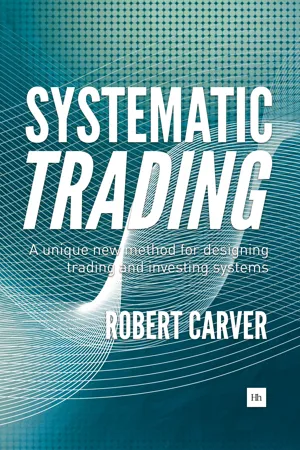
Systematic Trading
A unique new method for designing trading and investing systems
- English
- ePUB (mobile friendly)
- Available on iOS & Android
About this book
This is not just another book with yet another trading system. This is a complete guide to developing your own systems to help you make and execute trading and investing decisions. It is intended for everyone who wishes to systematise their financial decision making, either completely or to some degree. Author Robert Carver draws on financial theory, his experience managing systematic hedge fund strategies and his own in-depth research to explain why systematic trading makes sense and demonstrates how it can be done safely and profitably. Every aspect, from creating trading rules to position sizing, is thoroughly explained. The framework described here can be used with all assets, including equities, bonds, forex and commodities. There is no magic formula that will guarantee success, but cutting out simple mistakes will improve your performance. You'll learn how to avoid common pitfalls such as over-complicating your strategy, being too optimistic about likely returns, taking excessive risks and trading too frequently. Important features include: - The theory behind systematic trading: why and when it works, and when it doesn't.- Simple and effective ways to design effective strategies.- A complete position management framework which can be adapted for your needs.- How fully systematic traders can create or adapt trading rules to forecast prices.- Making discretionary trading decisions within a systematic framework for position management.- Why traditional long only investors should use systems to ensure proper diversification, and avoid costly and unnecessary portfolio churn.- Adapting strategies depending on the cost of trading and how much capital is being used.- Practical examples from UK, US and international markets showing how the framework can be used.Systematic Trading is detailed, comprehensive and full of practical advice. It provides a unique new approach to system development and a must for anyone considering using systems to make some, or all, of their investment decisions.
Frequently asked questions
- Essential is ideal for learners and professionals who enjoy exploring a wide range of subjects. Access the Essential Library with 800,000+ trusted titles and best-sellers across business, personal growth, and the humanities. Includes unlimited reading time and Standard Read Aloud voice.
- Complete: Perfect for advanced learners and researchers needing full, unrestricted access. Unlock 1.4M+ books across hundreds of subjects, including academic and specialized titles. The Complete Plan also includes advanced features like Premium Read Aloud and Research Assistant.
Please note we cannot support devices running on iOS 13 and Android 7 or earlier. Learn more about using the app.
Information
Chapter One. The Flawed Human Brain
Chapter overview
| Humans should be great traders, but... | The research that tells us why humans make bad decisions. |
| Simple trading rules | The dumb systems that are better at investing and trading than clever humans. |
| Sticking to the plan | Why you must be committed to your systems for them to work. |
| Good system design | Avoiding the human failings which can still be dangerous when designing systematic trading strategies. |
Humans should be great traders, but...
The death of rational economic man
Why we run losses and stop out profits
Table of contents
- Contents
- About the author
- Preface
- Introduction
- Part One. Theory
- Part Two. Toolbox
- Part Three. Framework
- Part Four. Practice
- Epilogue. What Makes a Good Systematic Trader?
- Appendices
- Thanks for reading